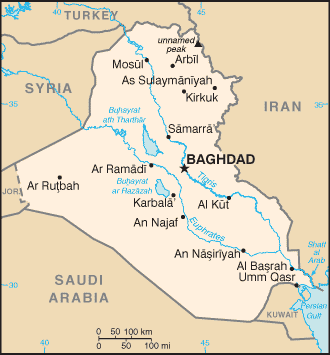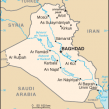The profiles of a number of Iraqi jihadi groups were prepared and released by al-Haq news agency (haqnews.net August 7). According to al-Haq, the material was collected through interviews with field commanders, jihadi forums and pertinent websites. The files accumulated by al-Haq, entitled, “The Media Jihad: a Reading of the Jihadi Media in Iraq,” were also distributed in some jihadi forums, prompting forum participants to add their corrections, additions and revisions (alboraq.info, November 8). Al-Haq decided to release these profiles in the jihadi forums after Arab media refused to publish them. Terrorism Focus will cover these profiles in two issues. Part One will discuss the Islamic Resistance Movement / 1920 Revolutionary Brigades, the Ansar al-Sunna Army, and al-Jaysh al-Islami in Iraq.
Islamic Resistance Movement / 1920 Revolutionary Brigades
The core members of this group are a mixture of Salafis, Muslim Brothers and independent Islamists, backed by a few Iraqi tribesmen and the Association of Muslim Scholars. The group claims no alliance with any political party and has an independent decision-making process. The political wing, the Islamic Resistance Movement (IRM), includes a political office, an Islamic decrees office, a jihad security office and a media section. The military wing is called the 1920 Revolutionary Brigades (1920-RB) and is comprised of over thirty battalions (according to al-Haq). The name of each brigade and its field of operations are given. The profile does not give the name of the group’s general leader, called only “the Amir,” but names the head of the political office, Mujahid Abdul Rahman, and the official spokesman, Abdullah al-Omari.
• Ideology
The group emphasizes its Islamic identity and religious justification for fighting the occupiers by relying on the teachings of the holy Quran and Sunna as a source of guidance in their religiously mandatory “defensive jihad” to evict the enemy from Iraq before moving on to “occupied” neighboring Muslim countries. The main objectives of the group are to expel the enemy and establish an Islamic Caliphate in Iraq.
The IRM reiterates that its jihad is complimentary to other groups’ jihads against occupiers. The group says, “We don’t claim to be the only jihadi group, but ask all our members to obey the leadership.” Abu Qodama, one of the field commanders of 1920-RB, says, “We cooperate with all jihadi groups, except the Baathist groups whom we deem non-Islamic polytheists.” Although an al-Qaeda onslaught on the IRM/1920-RB resulted in the death of some of the group’s leaders, the movement opted not to retaliate (ktb-20.com July 3, 2007).
The movement rejects the political process in Iraq and does not recognize the Iraqi government that resulted from this process. The group’s Amir believes peace is not possible in Iraq under U.S. occupation; therefore, any elections or referendums are irrelevant. Along with four other jihadi organizations, the IRM/1920-RB released a statement declaring any Iraqi government illegal during American occupation.
The movement affirms that their jihad is conditioned on not harming any civilians and rejects the principle of “the end justifies the means.” The group aborts any attack on U.S. forces that might result in killing innocent bystanders. The group also renounces all forms of sectarianism and judges people individually on the degree of their collaboration with the occupiers.
• Military activities
1920-RB fighters are deployed in the Sunni governorates of Iraq, using rocket and mortar attacks, light weapons ambushes, sniper attacks and roadside bomb attacks. The group also claims the downing of a British C130 Hercules in February, 2005, and the kidnapping of the American director of the Baghdad airport in April 2005 (Telegraph, February 2, 2005).
• Media activities
The group’s statements and video messages are broadcast by Arabic-language satellite channels such as al-Jazeera, al-Zawra and al-Rafidayn. The group also releases communiqués, video clips and al-Katayb, an internet magazine covering its military and political activities. Besides using jihadi websites such as al-hesbah.info, alboraq.info, hanein.info and muslm.net, 1920-RB has websites of its own – kataeb20.com and ktb-20.com.
Ansar al-Sunna Army
Founded in 2003 as a Salafi-Jihadi movement, this group is considered an outgrowth of the Kurdish-Sunni Arab Ansar al-Islam. The group includes former members of Ansar al-Islam and volunteers from Arab countries, although the original core was formed from members of al-Taifa al-Mansoura Mujahideen Brigades (TMMB). The TMMB later withdrew from Ansar al-Sunna and joined al-Jaysh al-Islami (see below). Abu Abdullah al-Hassan Bin Mahmoud is the Amir of the group and Shaykh Abdul Wahab al-Sultan is the religious mentor.
• Ideology
As the name implies, Ansar al-Sunna is a Sunni group following the Salafist path. The legitimacy of its insurgency operations is based on the religious duty of “defensive jihad.” In the founding declaration of the group, Amir Abu Abdullah Mahmoud said, “after the occupation of Iraq, jihad became a divine obligation on every Muslim. The objective of jihad is to expel the enemy and implement an Islamic Sharia government.”
Ansar al-Sunna’s operations and objectives are in conformity with all other Sunni jihadi groups, and, like many other groups, Ansar al-Sunna refrained from retaliating against al-Qaeda’s attacks on the group members.
In a statement released in June 25, 2006, Ansar al-Sunna rejected the democratic process in Iraq as illegitimate and blasphemous, condemning Prime Minister Nuri al-Maliki’s national reconciliation initiative and identifying members of Iraq’s parliament as apostates.
• Military activities
The group is militarily active in northern Iraq, the Sunni governorates and in some southern cities, where it targets national guards, police and the militias of the two Kurdish parties led by Jalal al-Talibani and Masoud Barazani. The group claims the bombing of offices belonging to Kurdish political parties in February 2004; the bombing of an American military base in Mosul on December 21, 2004; and the bombing of the Turkish Embassy in Baghdad in October 2003.
• Media activities
Like many other Iraqi jihadi groups, Ansar al-Sunna does not have continuous coverage of its activities in major news channels other than al-Jazeera, al-Zawra and al-Rafidayn satellite television channels. The group publishes Ansar al-Sunna magazine, the Mujahideen Harvest news bulletin and has its own website (ansar11.org). Ansar al-Sunna posts almost daily reports of allegedly successful attacks on U.S. forces in Iraq, along with other political and religious statements. Ansar al-Sunna rejected the U.S.-Iraqi security agreement in a religious decree released by the group on November 20.
Al-Jaysh al-Islami in Iraq
The existence of this Salafi-Jihadi group backed by Sunni tribes and ex-military officers was first announced in late 2003, but the group claims it was actually formed before the occupation of Iraq. The group’s “defensive jihad” aims to rid Iraq of the U.S. occupation before setting up an Islamic Sharia government. Regardless of discord with some jihadi groups and internal fighting with al-Qaeda, al-Jaysh al-Islami declares it has no animosity with any jihadi group, but rather endeavors to unite with them under a single leadership. Dr. Ibrahim Yusuf al-Shamari is the group’s official spokesman, Dr. Ali al-Naimi the media spokesman, and Imad al-Din Abdullah the director of central media information.
• Ideology
Like many other Sunni groups, al-Jaysh al-Islami rejects the current political process in Iraq but accepts any process within the framework of Islamic constraints. It also believes the occupier should compensate Iraqis for moral and physical damage inflicted by the occupation.
• Military activities
Al-Jaysh al-Islami is considered the biggest jihadi group in Iraq and deploys in the Sunni governorates in Baghdad, al-Anbar, Salah al-Din, Mosul, Kirkuk, Diyala, Babel, central Basra, and al-Amara. The group’s military targets include U.S. forces, the Iraqi military, Iraqi police and the Badr (Shiite) militias. The group is well-known for it use of roadside bombs, snipers and rocket attacks. The intelligence unit of the group is responsible for a number of notorious hostage-takings and the kidnapping and killing of American civilians working with Iraq’s housing ministry. Abu Moshtaq al-Zebaidi is the group’s military commander.
• Media activities
The group has a number of regular publications of its military operations under names such as Aydo (Prepare); Sout al-Jihad (Voice of Jihad); Fi thikra al-ihtilal (On the Anniversary of Occupation) and Alyoum wa ghadan ya Amerika (Today and Tomorrow, O America). Special publications of the group cover unique subjects, such as weapons of mass destruction and the activities of the “Baghdad Sniper.” The different formations of al-Jaysh al-Islami also release their own accounts of attacks on the occupiers with videos bearing titles such as Sawaeq al-Fallujah (al-Fallujah Detonators) and Istamiro Ya Asood al-Anbar (Continue al-Anbar Lions). The group’s best-known regular publication is al-Fursan magazine, with 16 issues so far. Al-Jaysh al-Islam probably leads all Iraqi jihad groups in the number of websites and internet forums it maintains. Its official website, iaisite.org, is run by the group’s media corps, along with alboraq.info, alboraqmedia.org, baghdadsniper.net and lee-flash.com.






